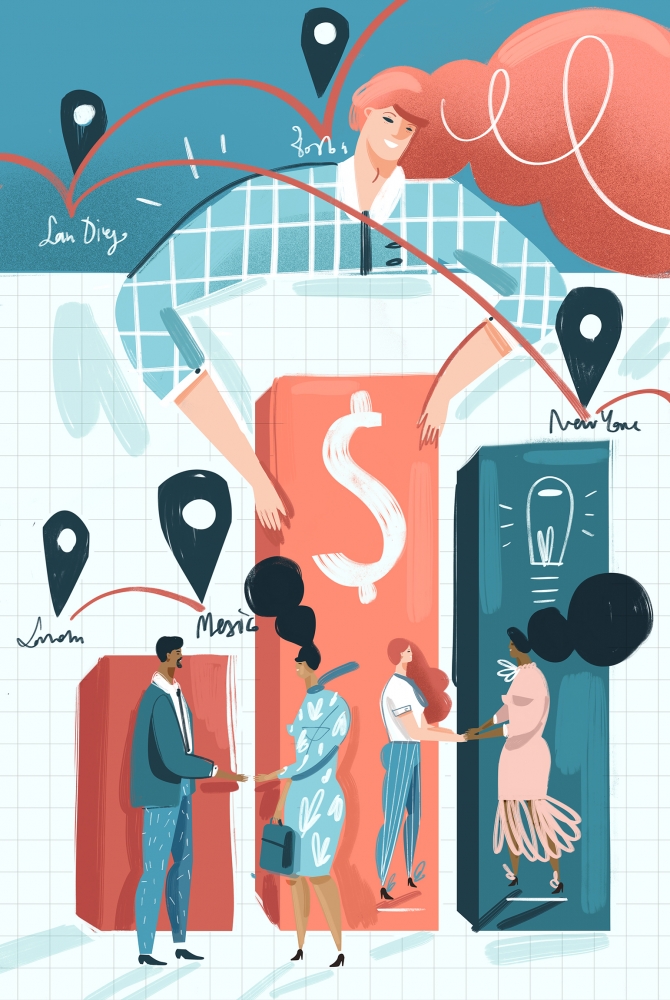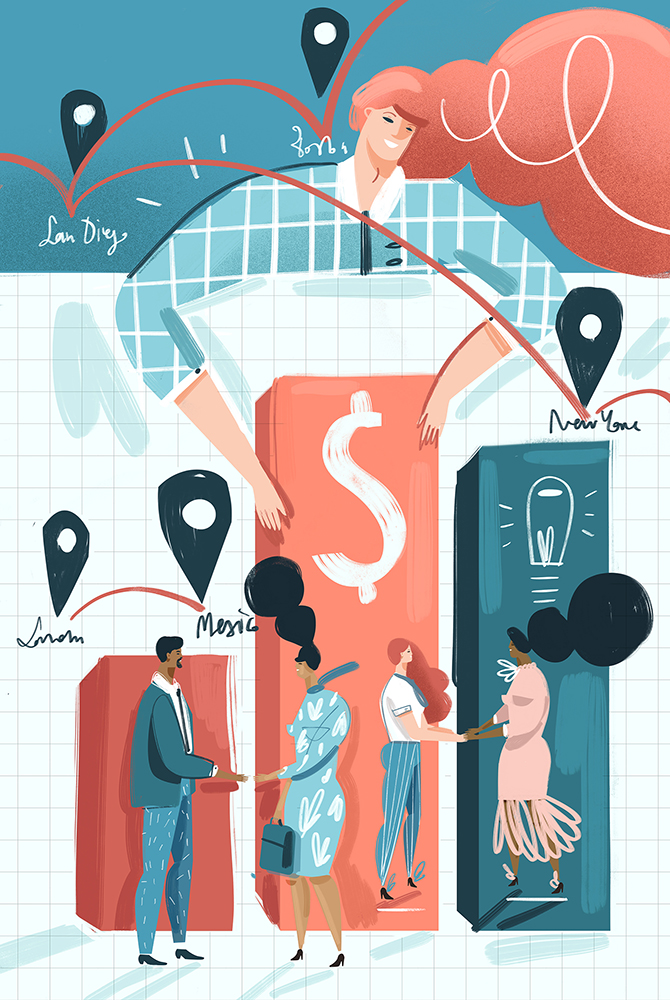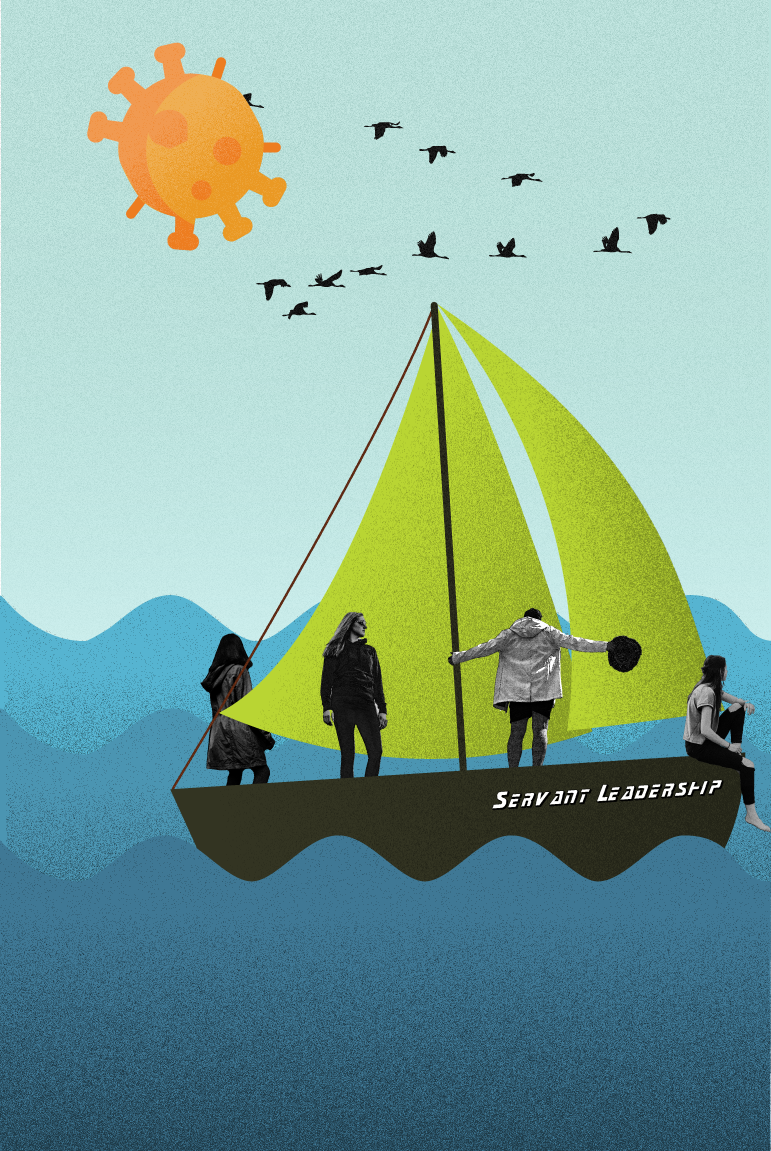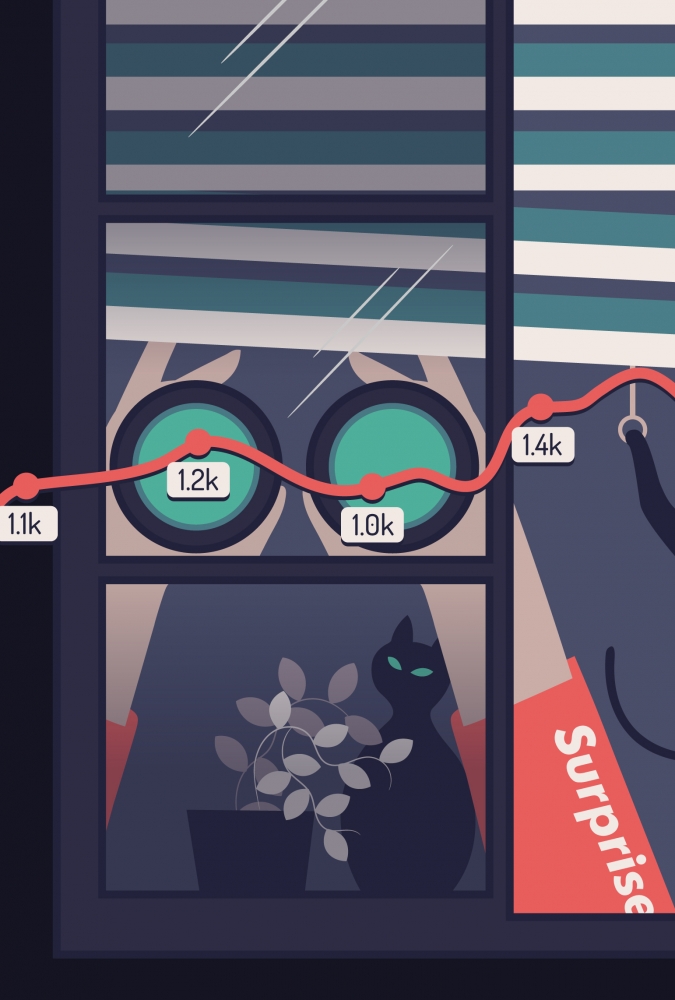
Regina gave us some insight on what she has accomplished as an entrepreneur globally. She also gave us some crucial tips for any curious-preneurs.
To start us off, can you tell us about what you do at the University of San Diego? We’re especially curious about what you’re working on with Venture Vetting, the campus-wide entrepreneurship competition.
To give you some context, I’ll tell you a bit about my specific areas of passion, as that’s really what informs the work I do. I love female investors and female entrepreneurs, so that has been a huge area of focus in my work. A big part of what I do is in helping and supporting women to be more represented in the investment scene. It’s very disproportionate to look at women starting a business—in how much investment they get, versus how many investments men are able to get.
So, one of the things I’m hoping to do is a partnership between the University of San Diego and the Hera Venture Summit. The aim of it is to bring Angel investors from all over the world together with female founders—with the hope that providing a space for them to connect and get together would give them better access to capital. Through conferences like this one, we’ve been able to now help raise over three million dollars to support female founders. That’s one piece of the work I do; the other piece is the cross-border piece.
In the world of innovation, ideas flow freely; so two years into my job at USD, I helped start the first cross-border entrepreneurship competition. At that time, there wasn’t another university doing this kind of cross-border, specific effort to pitching new companies. That’s how it all got started.
What kinds of people or companies do you typically see entering the competition? What happens with the winners? Have their companies or ideas flourished?
It’s mostly a lot of young entrepreneurs with venture ideas. To give you an example, right now we have a company that I love, called Generations. They’re one of the companies that won last year. Essentially, Generations aims to connect older people to younger people. It’s kind of like an Uber-type model.
There are so many people nowadays who live far from their parents, and there’s a large amount of aging people who are very lonely, don’t have caretakers, and can’t even go to the grocery store. On the other hand, there’s a number of young people who would love to help, provide a service to the community, and maybe make some extra cash. So, this platform helps to make that connection. It allows people to start building a business and gain some additional income. Even stay-at-home parents, who for example can’t go to work full-time, but are available to go run an errand—like take someone to the grocery store or take them to a doctor’s appointment—and earn a little cash while they’re at it.
We have a wide representation of companies working with us. One is more of an engineering type of project; one is in jewelry; another is a smart or crypto-like technology that helps to hand over keys to rental places, like with Airbnb. There’s another one I really like, which is an app that connects students around mental health issues. Another one still is a form of safety crowdsourcing, where people can report crimes in an effort to keep others safe—which is very important in Latin American countries.
So you can see, this was last year—and this happens to me every year—these were the final ones, but in the background, I worked with over thirty, and by the end of the year it came down to these. Throughout the year, we do training sessions with the students focused on pitching and coaching. I love seeing the moment someone has a spark of an idea that inspires them to do something; and then walking them through the process to actually making it happen all the way—towards being able to get some money to actually launch. That’s what gets everyone really excited.
I love seeing the moment someone has a spark of an idea that inspires them to do something; and then walking them through the process to actually making it happen all the way—towards being able to get some money to actually launch.
So, the program is campus-wide—but is it only open to students? How does the cross-border part of it fit in? Who else is the competition open to?
At this point, it’s actually mainly for students from other countries. At first, the entrepreneurship competition was limited to USD students, but then it quickly grew to Mexico. As of this year, it’s huge—we’ve expanded the competition to all over Latin America.
Now, we’re working with companies from Colombia, Peru, Brazil, Argentina, Uruguay. We just recently went through an entire mentorship and coaching process to finalize two companies that will be joining USD in April—one from Chile, and the other from Uruguay. Just knowing that ideas are flowing freely between countries is a part of this that makes me super excited.
Not only that, but I can see the idea continuing to grow on a global level. It gets people thinking about what other ways ideas can expand when you just start from your original, specific framework. When you open your mind to the world, it becomes like a very interesting place.
It’s been amazing and exciting to see what other countries are working on, what kinds of technologies they’re developing, what problems they’re trying to solve and what’s important to them overall. It gives you a global perspective that really takes you out of your original way of seeing things.
Hopefully, we’ll be able to expand even further in the world and continue to do these types of collaborations. It’s definitely an area that I foresee getting a lot of growth, and I’d love to see our program being a leader in it as well.
At this stage, it’s fair to say this initiative is something that sets USD apart. You’re creating an opportunity for people in countries like Mexico and Chile, who otherwise likely wouldn’t have such a chance. No matter where you are in the world, as a young entrepreneur, you’re probably not just going to have someone give you money to fund and help start your organization. Especially in the countries you’re working with—it’s so much harder out there as young entrepreneur who may be full of ideas they’d like to create and share but are lacking the resources to do anything about it.
Exactly—and it’s not just about the funding. Being able to come and pitch your idea on a stage—in front of angel investors and other people in the audience that could take your idea to the next level—that in and of itself is such a huge opportunity.
We’ve had situations where people came from Mexico, pitched their idea, and then people who were in the audience contacted me later on and said, “Hey, I actually have contacts in this organization that would make for a great strategic partner for that student. Would you mind if I connect them?” And I’m like, “Of course! Go ahead.”
So, other than just cash value, there could be even one person in the audience that could completely change the trajectory of your venture—and subsequently, of your life. So, being in—and building—that kind of nourishing environment to allow for that, is probably one of my favorite things about USD as well. It’s great for our students, of course, but we are an anchor institution—not just in San Diego, but in the world—so we’re also paying attention to how we can better work with those communities.
You often hear, “I wish I was an entrepreneur, but I don’t have an idea…” People really get stuck at the idea part of it, but the thing is: Ideas can change.
How did you get this competition started? How long did it take, who was working on it?
Seven years ago, it started with Mike Lawless our Academic Director of Entrepreneurship Initiatives and myself. Of course, there’s our entire School of Business—which supports us and has been so important to our growth. I’ve worked really closely with the Entrepreneurship Club, so this is very much also led by students—I’d say it’s largely student driven.
Over the years we’ve been running the program, it has completely changed. Not only has it grown so significantly; it has reached a point that was beyond our wildest expectations in terms of how much student engagement it garners. In the early years, I would get maybe two students coming forward—now, for every session that we run, I get over a hundred applicants.
What I really like about it is it’s a lot of students who are coming to us from outside of the Business School. It’s engineers, creatives, designers—you name it. I think entrepreneurship is not just about being in one specific major; you really can come from any area of study, and we’ll be happy to support you.
It seems like it’s really about whether you have an idea, the drive to run with it, and the motivation to push on through, that makes you an ideal candidate for this competition, or for an entrepreneurial path in general.
Well, that’s the thing. You often hear, “I wish I was an entrepreneur, but I don’t have an idea…” People really get stuck at the idea part of it, but the thing is: Ideas can change.
I have yet to meet one entrepreneur whose original idea is what went on to be successful. It starts in one place; then it changes so much in the process to get to where it needs to be, that the initial idea—in its untouched form—rarely makes it all the way to success.
It’s like a diamond. You have to continue to inspect it, to see what it is; you have to change, and you have to listen to people. Something can start off as, “Oh, I think this would be cool,” and the more you bring it around people, the more you realize it needs to be shaped.
So, I work a lot to dispel the myth that entrepreneurship means you have to come in with some sort of well-rounded, genius idea. It’s so much less about an idea, and so much more about how you approach it. It’s learning to pivot, to change along with your ideas, to adapt to changing markets and needs, and being flexible.
Position yourself in very entrepreneurial environments—places filled with people who allow you to be creative.
That’s an interesting mindset-shift you’re proposing. Many of us look at entrepreneurship and think that first and foremost you need an idea to run with. Otherwise, how else are you going to build anything—with no idea to speak of as your starting point? I can admit, what you’re saying is a completely new thought for me. What advice would you give, in this case?
I think you’re part of the majority in terms of people who think that way, and that’s why we spend so much time talking about this. There are so many people who might have an entrepreneurial personality—that type of overall approach to life—but they don’t act on it because they don’t have a specific idea.
It could be the way you are within an organization, or the way you do things. Maybe, you’re not necessarily a renegade—but you envision a different world. So you can definitely be entrepreneurial, without having a specific idea. I even feel like in my case, I’m an entrepreneur, just through the way that I’ve helped to build this program. I get other ideas along the way, but this wasn’t necessarily a specific idea for a company, and I still feel as though I’m very entrepreneurial in the way that I function.
So, for someone who thinks like, “You know what, I really enjoy this atmosphere. It’s a really good fit to my values, and to where I want to be in life,” I would say this: Position yourself in very entrepreneurial environments—places filled with people who allow you to be creative. You never know from that if it’s going to spark the “big” idea. Or, maybe you’d be happy adding your value and expertise to someone else’s idea. So think about a small, developing company—that might make for a really good fit, right there.
I think people put so much weight on this one particular “successful idea” that you have to be so passionate about. That it has to be this life-changing, lightning-bolt moment when it all just clicks for you. I don’t think it always happens that way.
If you’re in an environment where you’re around entrepreneurs, and you’re often finding yourself in these kinds of entrepreneurial-adjacent conversations—like, you actually enjoy being in them, or hearing stories of startup founders—then that’s a big signal that you may be more entrepreneurial than you think. Maybe a big corporate job, or being behind a computer crunching Excel won’t be the greatest fits for you.
Some people also approach their work like, “Just give me the tasks that I need to do, and I’ll get them done—I don’t need to be around people in the meantime.” I think there’s a lot of internal work that you also do in your time here, so that also fits with the entrepreneurial approach to work.e
Do you have any advice for aspiring entrepreneurs, or “curious-preneurs”, as you call them?
Well, of course it’s scary—and it’s scary for all of us—but you’ll just learn so much about yourself along the way. It’s definitely a path with lot of self-discovery. You have to tap into a lot of different parts of your brain, your personality, and how you manage stress. So, going on an entrepreneurial journey will give you—as a person—so much, regardless of the outcome.
I think that in your twenties, your biggest goal should be to learn as much as you possibly can. Position yourself to be alert, and always try to be the least smart person in the room. I feel like that’s my case all the time, and I’ve learned so much—just from listening, observing, from being around smart people.
Don’t be so afraid of having that first “amazing” idea. I think there’s this misconceived notion that suddenly you’re going to see this light and it’ll be like, “this is the idea.” Keep in mind, entrepreneurship is more about doing something that you love as opposed to being “the one with the original idea.” Just being around entrepreneurs—in that entrepreneurial energy—you can be an entrepreneur in all kinds of ways.
A really big thing to keep in mind is that a lot of great ideas come from solving a problem—either a problem that you see for yourself, or maybe that you notice in others around you.
Another really big piece of advice for a young entrepreneur would be to intern or work in an entrepreneurial environment and see how you feel—maybe even before you launch your own things—so that you could learn from others. If you’re part of a startup, or a smaller-sized entrepreneurial organization, you’re going to have a lot of responsibilities that make you an important part of the greater whole. In a startup, every single one of the people in the team is crucial to the development of the venture and the company. So, if you’re able to go into a startup, learn as much as you can—network, build your group of advisors, even mentors—that’s a huge piece of it as well.
Keep in mind, entrepreneurship is more about doing something that you love as opposed to being “the one with the original idea.”
We have one question that we like to each of our interviewees. Could you give us one life hack—a way that helps you to stay innovative on a daily basis?
One of the things I’m really focusing on a lot lately is the belief that life is less about what happens to you and more about how you react.
In an entrepreneurial environment, you could be facing a lot of lows and setbacks on a daily basis. You can have all these expectations, and then different situations and outcomes will cause you to shift. And when that happens, what really shapes you is to say, “Okay, you know what, it didn’t work out how I wanted it to, but that’s just what happens in life, and I can still choose my reaction. So, even if it didn’t go my way, I’m just going to react in a different way and I’m just going to keep moving.” Kind of consciously shifting your mindset. As an entrepreneur, you have to do that maybe a hundred times a day. So it’s about staying flexible and being able to adapt.
Even if you think about it from an evolutionary perspective, that mindset is really what makes a difference in survival. If one thing in one day completely sends you on this downward spiral, then you’ll never be able to just take a breath, shift your perspective, and carry on.
Regina Bernal is anentreprenurial business leader and an entrepreneurship manager for the University of San DiegoSchool of Business. Regina manages and co-created the V2 Pitch Competition,and mentors student entrepreneurs. She has enchances USD’s cross-borderrelationships with her bicultrual background and placed among San Diego’s 500 Most Influential Business Leaders 2018.In 2016, she save a talk at TEDxSanDiego on the power of innovation in multinational business relations, examinging theborder region of San Diego and Tijuana. Regina is also involved in apartnernship with the Hera Ventura Sumit that brings female entrepreneurs fromall over the world to San Diego.
Keep up with Regina on LinkedIn
Illustration by Iwona Kazia.



